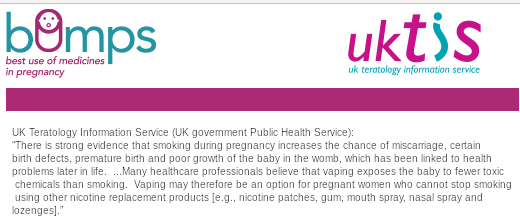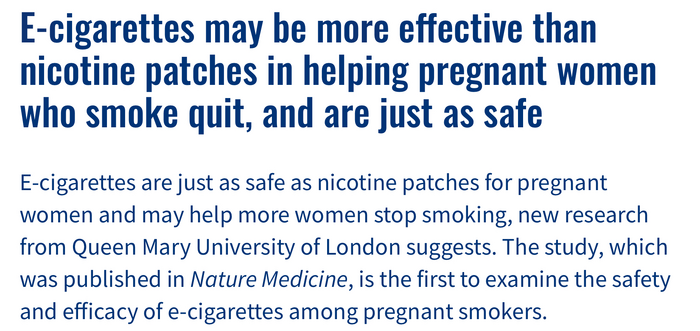ENDS Pregnancy
Studies, Surveys, Papers, and Case Studies
- Sometimes it's necessary to view the PDF version to access the full study.
- This page is for referencing the possible benefits of ENDS products vs. smoking cigarettes for Pregnant women. (Electronic Nicotine Delivery Systems are also known as vapor technology, ecigarettes, ecigs, EVP, etc.)
- If you'd prefer someone else to add a study to a topic, there is a subject section called "Suggested studies to add to this page". You may put the link in that section for one of the regular page editors to address.
- If you'd like to help add content to this page, please see the directions at the bottom of the page.
2022: Electronic cigarettes versus nicotine patches for smoking cessation in pregnancy: a randomized controlled trial
- The finding of better use of e-cigarettes tallies with e-cigarettes being a more popular aid to stopping smoking than NRT among people who smoke at the population level. It is worth noting that although the cost to participants was higher for e-cigarettes, the cost to treatment providers was higher for NRT.
- The findings do not suggest that e-cigarette use in pregnancy poses larger risks than the use of NRT, despite the fact that e-cigarettes were more likely to be used and were used for longer periods than NRT.
2020: Potential effects of using non-combustible tobacco and nicotine products during pregnancy: a systematic review
- This review demonstrates that the evidence does not support denying pregnant women the use of smoke-free products if the alternative is that she would continue to smoke.
2020: Addressing and Overcoming Barriers to E-Cigarette Use for Smoking Cessation in Pregnancy: A Qualitative Study
- Smoking in pregnancy causes considerable harm, including increased risk of low birthweight, preterm delivery and stillbirth. Positive beliefs about vaping, particularly in comparison to smoking and becoming a confident vaper, were viewed as ways to overcome potential or experienced barriers to vaping. Our research findings may help develop interventions to assist women who have tried to stop smoking but have not quit and would otherwise continue to smoke during pregnancy.
2020: Smoking and use of electronic cigarettes (vaping) in relation to preterm birth and small-for-gestational-age in a 2016 U.S. national sample
- These findings suggest that vapers during pregnancy had similar risk of preterm as non-users but still had elevated risk for restricted fetal growth.
2020: Electronic cigarettes and obstetric outcomes: a prospective observational study
- The birthweight of infants born to EC users is similar to that of non‐smokers, and significantly greater than cigarette smokers. Dual users of both cigarettes and EC have a birthweight similar to that of smokers.
2019: Electronic cigarette use in pregnancy is not associated with low birth weight or preterm delivery
- Infants born to users of electronic cigarettes had a mean birth weight of (3482g), which was similar to non-smokers (3471g) and significantly greater than that of smokers (3166g).
2019: E-cigarette minimum legal sale age laws and traditional cigarette use among rural pregnant teenagers
- E-cigarette Regulations Increase Prenatal Cigarette Use Among Teen Smokers, Study Shows (Article) Teenagers under 18 could legally purchase e-cigarettes until states passed minimum legal sale age laws. These laws may have curtailed teenagers' use of e-cigarettes for smoking cessation. These results suggest that the laws reduced cigarette smoking cessation during pregnancy rather than causing new cigarette smoking initiation. Our results may indicate an unmet need for assistance with smoking cessation among pregnant teenagers.
2019 The Effect of E-Cigarette Taxes on Pre-pregnancy and Prenatal Smoking
- We show that e-cigarette taxes increase pre-pregnancy smoking, increase prenatal smoking, and lower smoking cessation during pregnancy. These findings imply that e-cigarettes and traditional cigarettes are substitutes among pregnant women.
- PDF Version
- Citation: The Effect of E-Cigarette Taxes on Pre-Pregnancy and Prenatal Smoking, and Birth Outcomes - Rahi Abouk, Scott Adams, Bo Feng, Johanna Catherine Maclean, and Michael F. Pesko, NBER Working Paper No. 26126, July 2019, JEL No. I12
- Acknowledgements: Research reported in this publication was supported by the National Institute on Drug Abuse of the National Institutes of Health under Award Number R01DA045016 (PI: Michael Pesko).
2017: Indoor E-cigarette Restrictions Increase Prenatal Smoking
- (Article) The effect of e-cigarette indoor vaping restrictions on adult prenatal smoking and birth outcomes (Study) (Must pay to view whole study or PDF) Our panel model results suggest that adoption of a comprehensive indoor vaping restriction increased prenatal smoking by 2.0 percentage points. Places with indoor e-cigarette restrictions slowed the downward trend in tobacco cigarette use in pregnant women by 30 percent compared to places with no e-cigarette restrictions.
2017: Correlates of Electronic Cigarettes Use Before and During Pregnancy
- The study also shows that electronic cigarettes are commonly used as a smoking cessation aid in women of reproductive age. The greater likelihood of electronic cigarette use compared to proven adjunctive smoking treatments suggests that electronic cigarettes should be examined as a potential aid to cessation in this population.
See Also
![“All midwives and maternity support workers should be confident and competent in discussing smoking in pregnancy. Nicotine Replacement Therapy [e.g., nicotine patches, nicotine gum] is safe in pregnancy and should be provided in line with evidence-based protocols to women and their partners. E-cigarettes contain some toxins, but at far lower levels than found in tobacco smoke. If a pregnant woman who has been smoking chooses to use an e-cigarette (vaping) and it helps her to quit smoking and stay smokefree, she should be supported to do so. If a woman has switched completely to vaping and is not smoking at all, she should be recorded as a non-smoker. Based on the available evidence on e-cigarette safety, there is no reason to believe that use of an e-cigarette has any adverse effect on breastfeeding.”](/mediawiki/images/thumb/5/57/RCoM.png/700px-RCoM.png)
https://www.rcm.org.uk/media/3394/support-to-quit-smoking-in-pregnancy.pdf

https://www.medicinesinpregnancy.org/Medicine--pregnancy/E-cigarettes/#
News items:

PAGE EDITORS - Please only add Studies, Surveys, Papers in this format to keep page organized
- Topic
- Year (list new to old) Name of Study (In link format to the study)
- Note here if animal study (leave blank if not)
- Brief Summary
- Link to PDF Version
- Citation
- Acknowledgements (funded by, helped by)
- Keywords
- Other
Suggested studies to add to this page
https://www.cochranelibrary.com/cdsr/doi/10.1002/14651858.CD010216.pub6/full